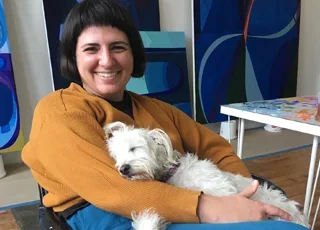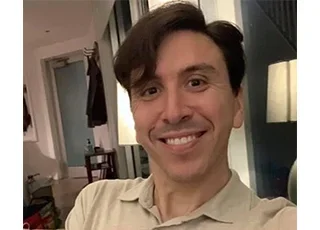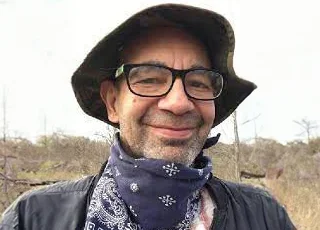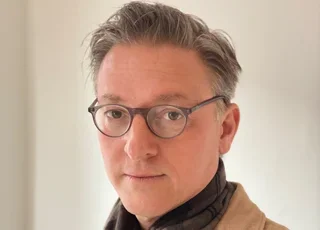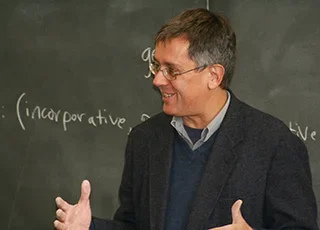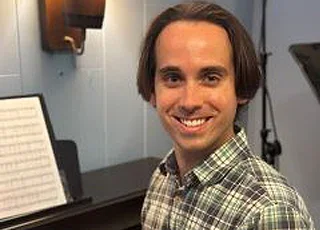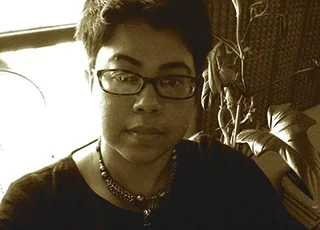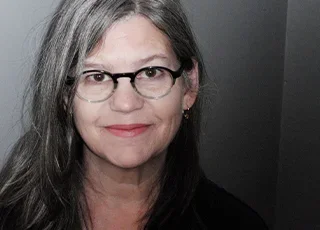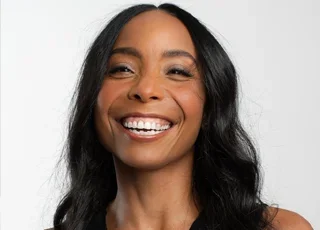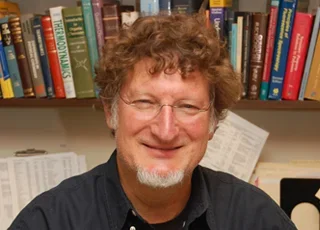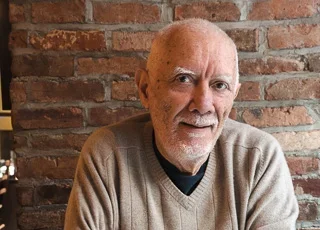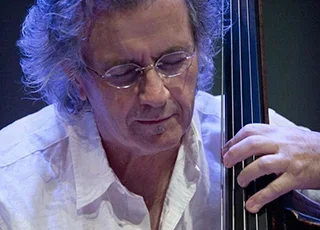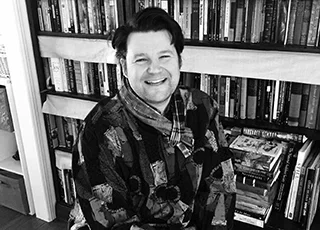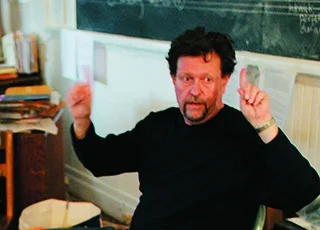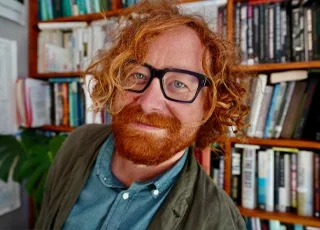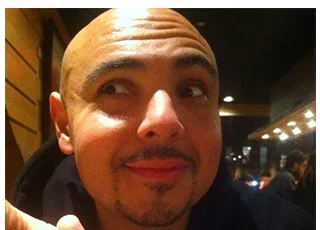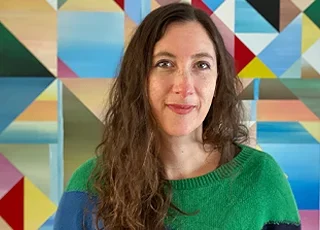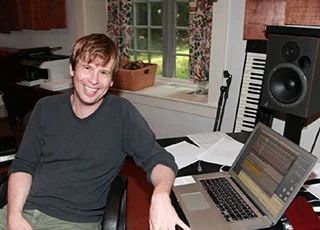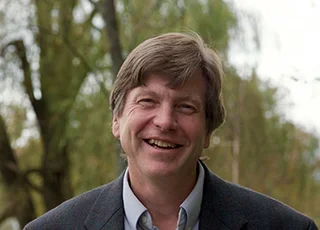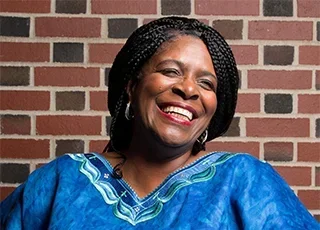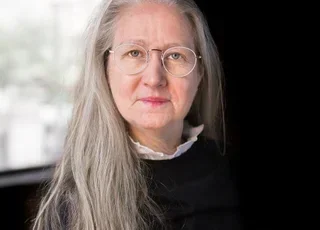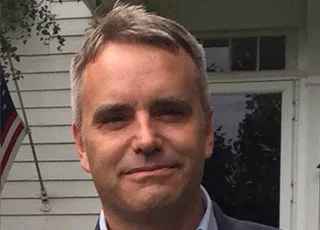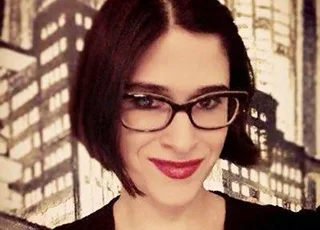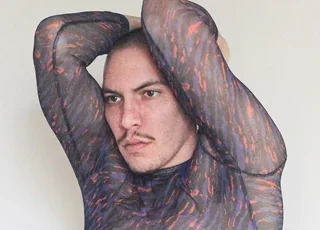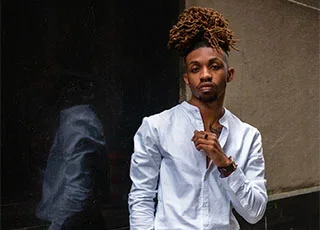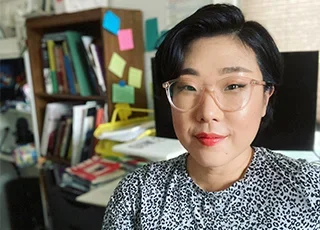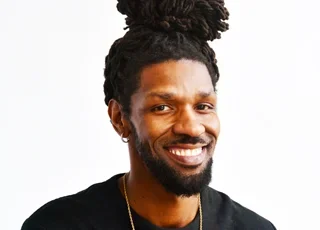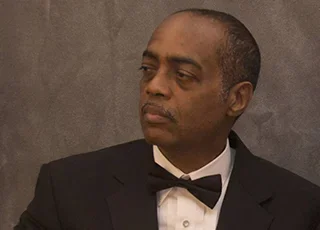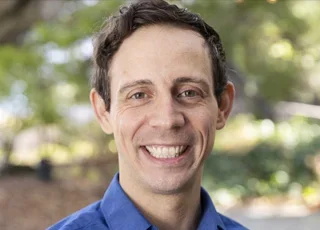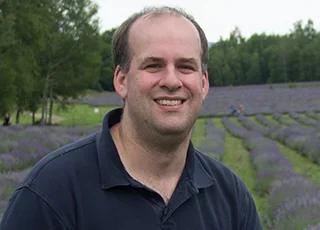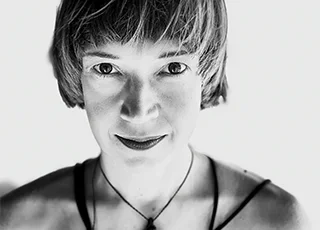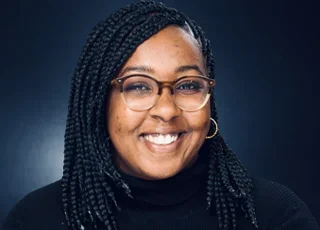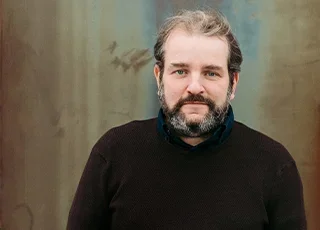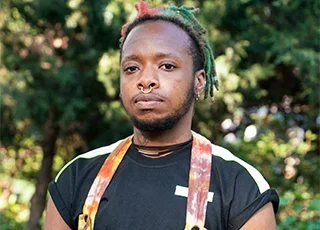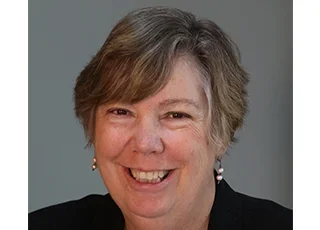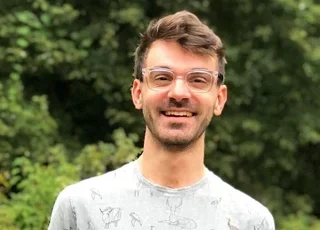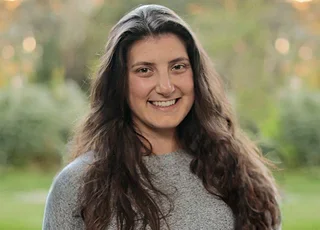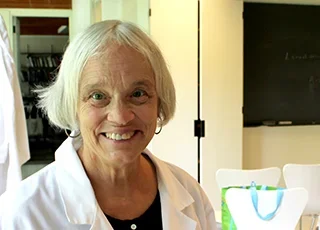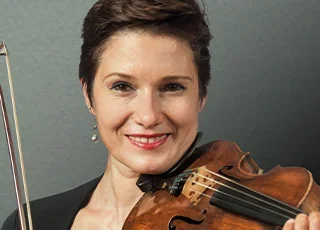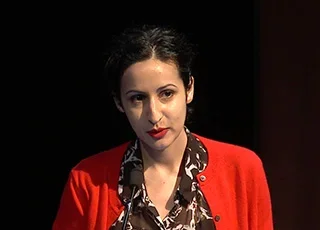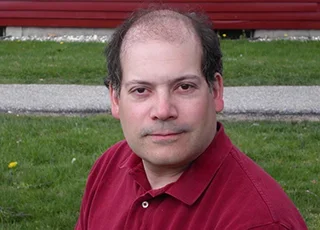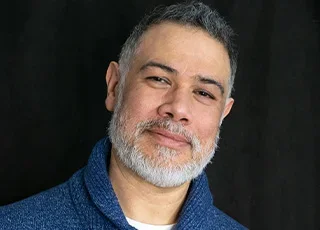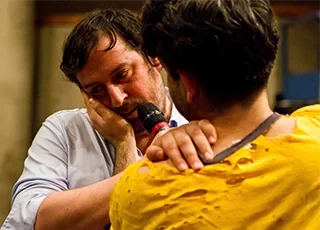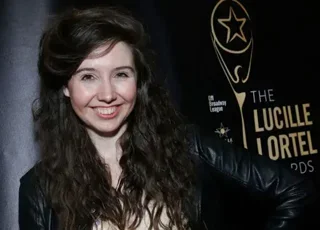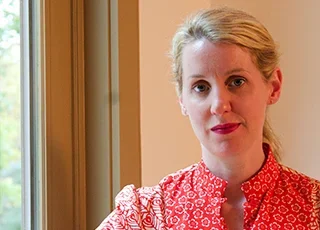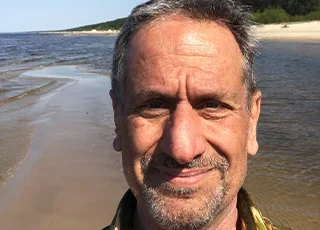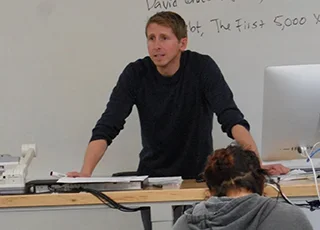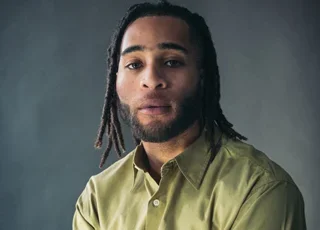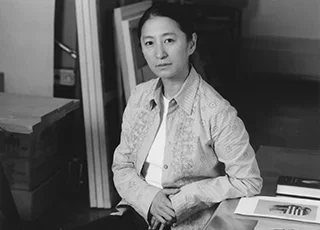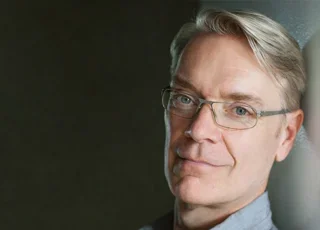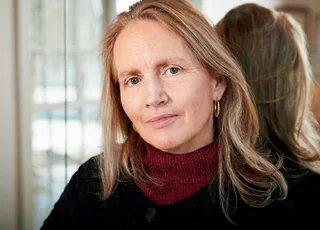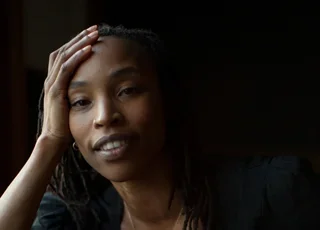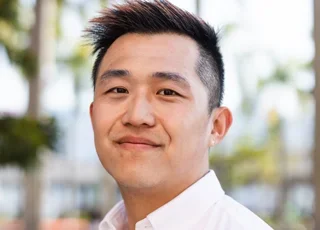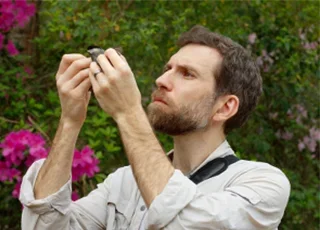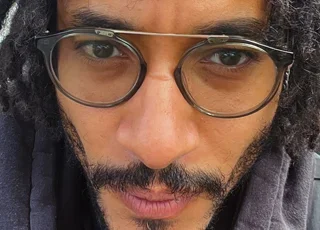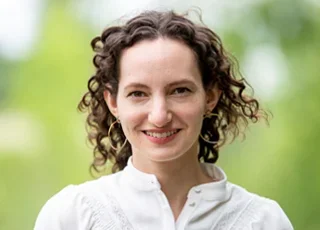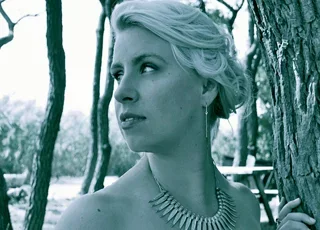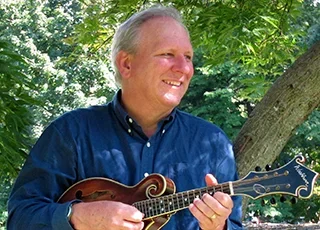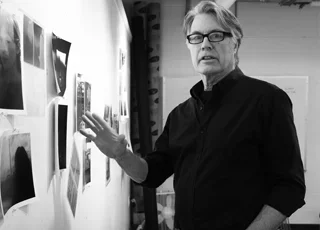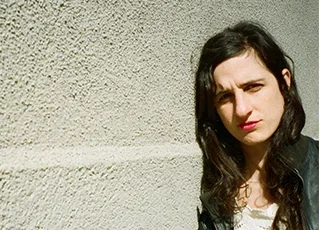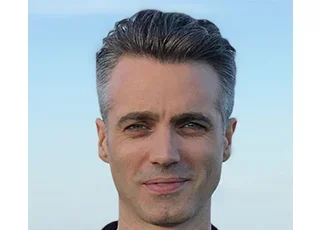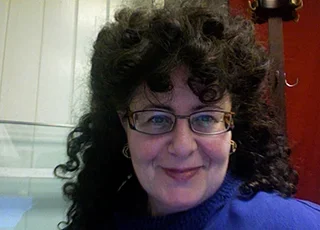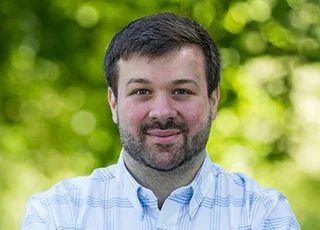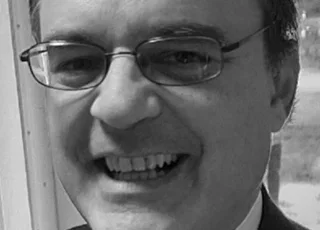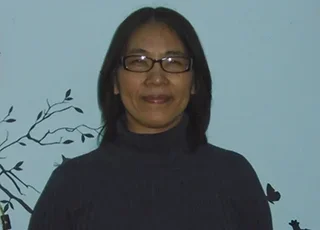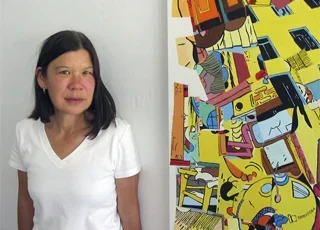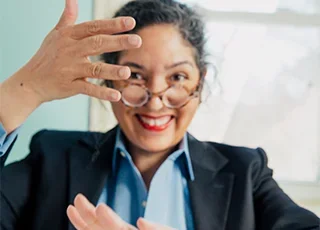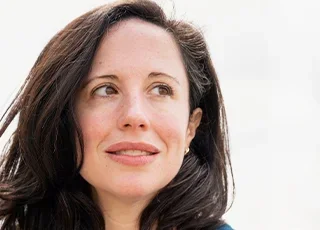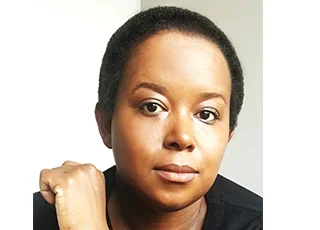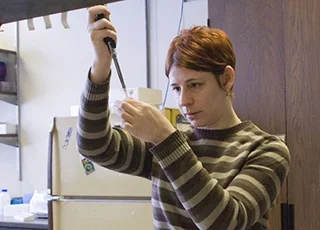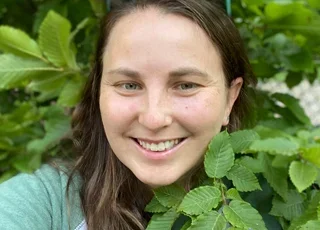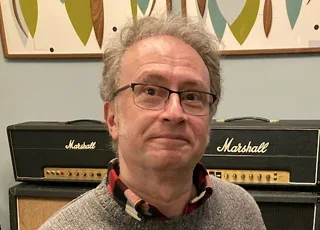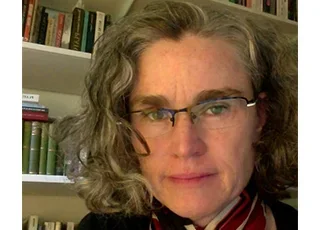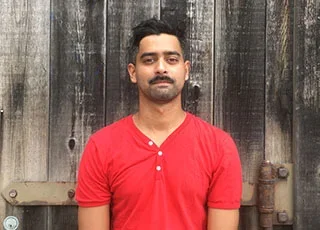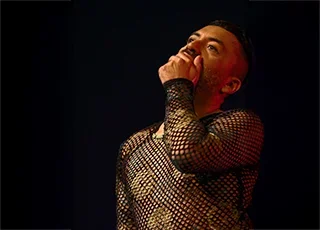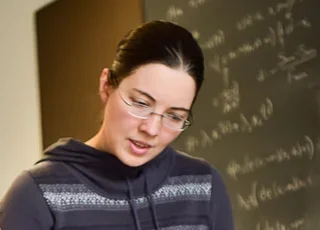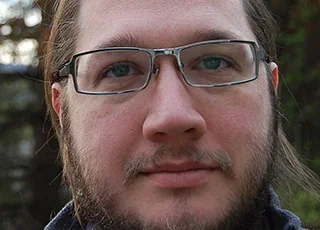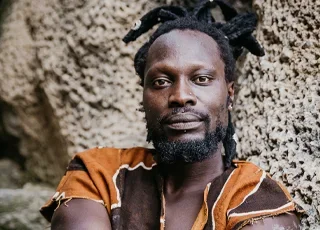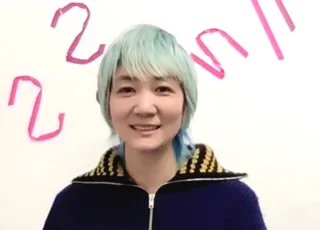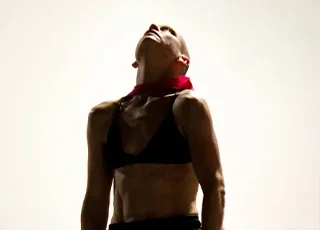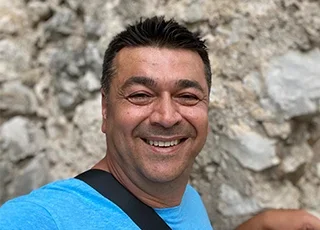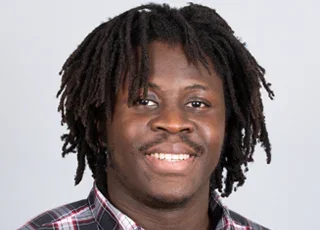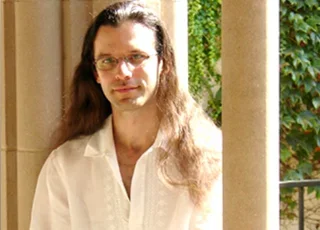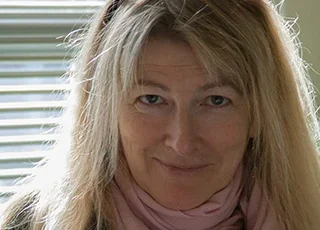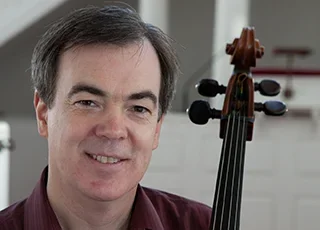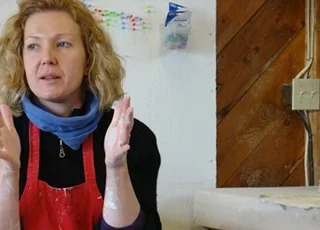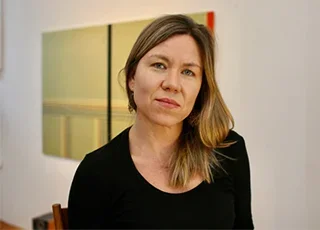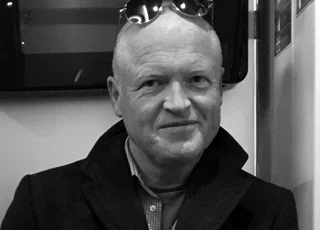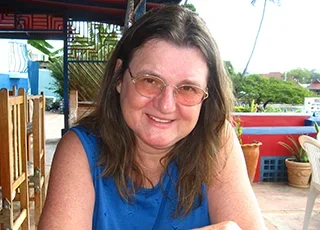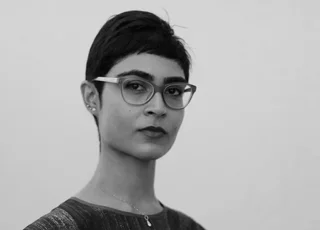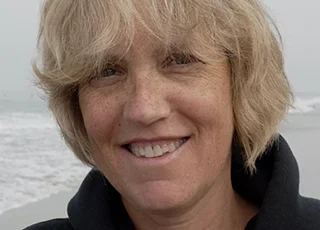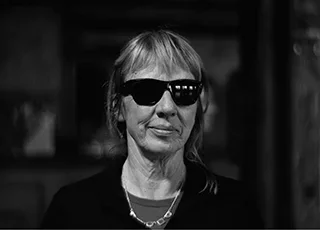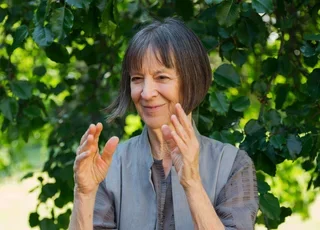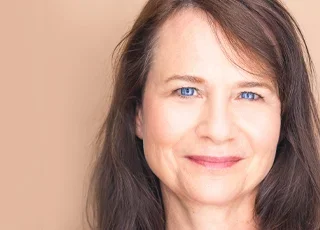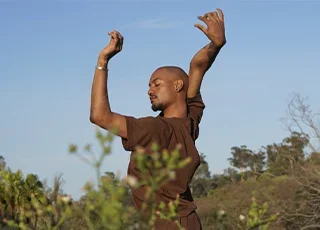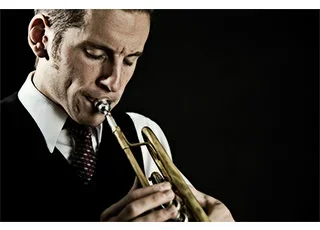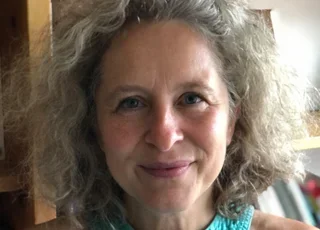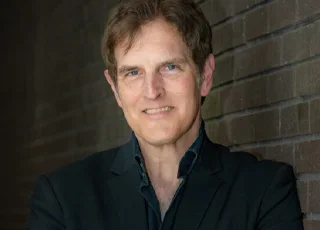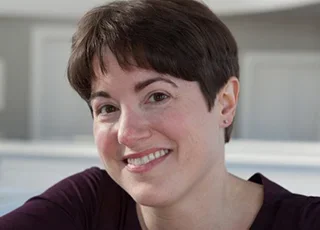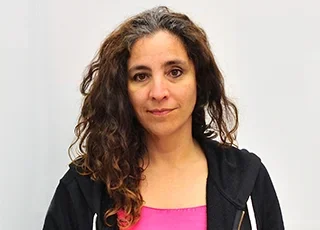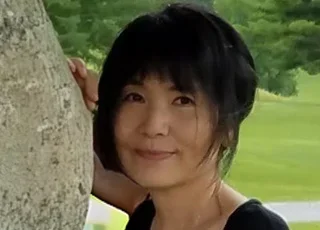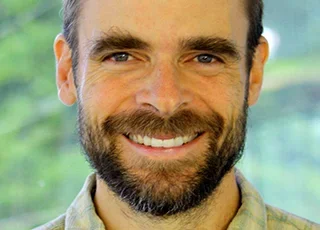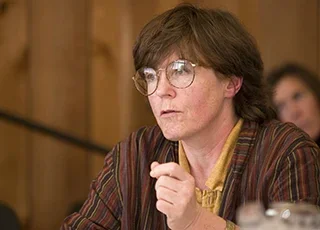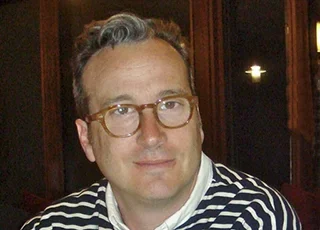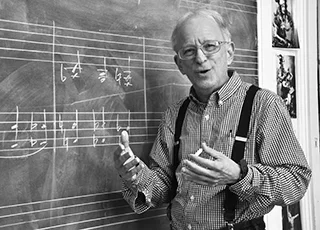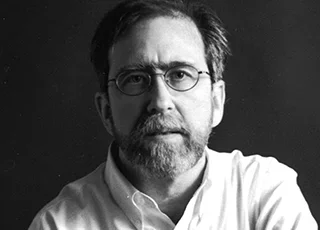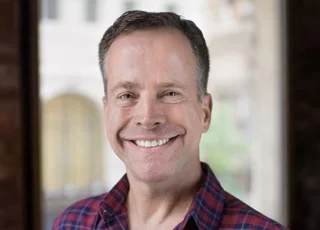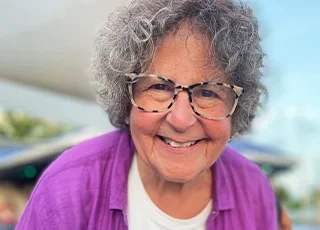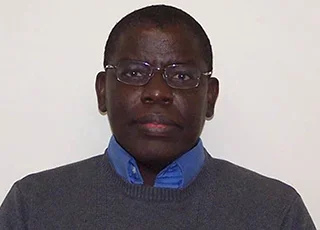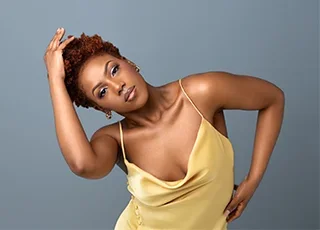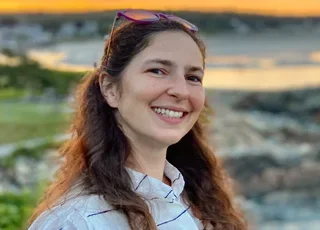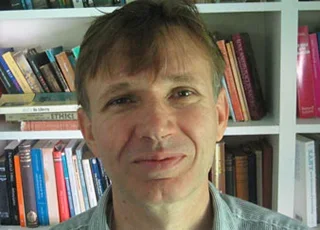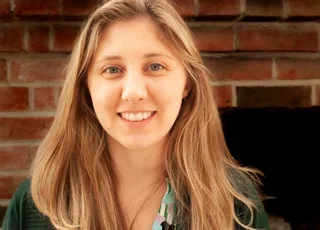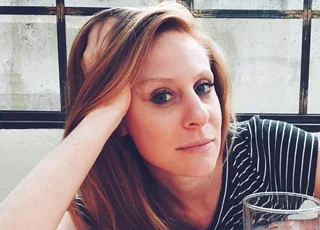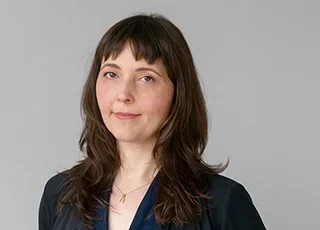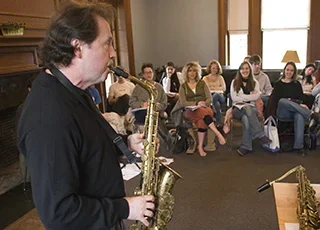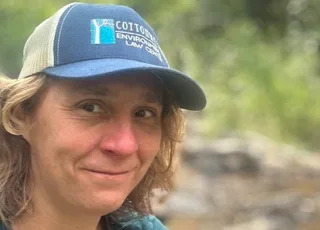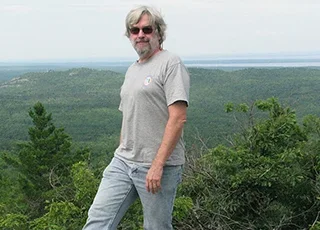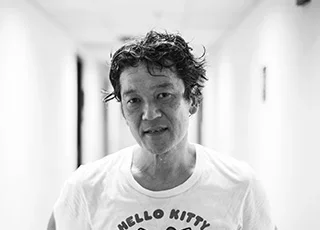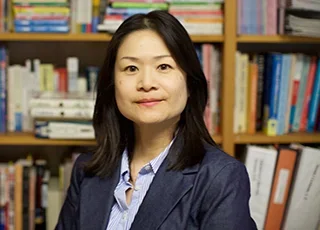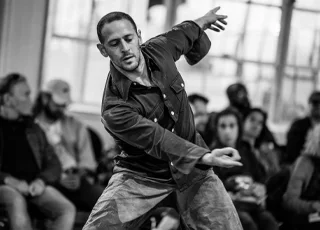Faculty
Bennington’s teacher-practitioner model means that students work in close collaboration with faculty members who are themselves actively engaged in their fields.
The faculty at Bennington are both mentors and guides. They oversee the unfolding of the Plan Process by helping students discover their distinctive intellectual passions and figure out how these interests might shape an education of depth, breadth, and rigor. Through ongoing conversation, in one-on-one advising sessions, and as part of Plan Committees, faculty help students steer their work in the most compelling directions.
Beverly Acha is a New York-based visual artist working in painting, printmaking, and drawing. Her work is informed by the visual and spatial languages of landscape, architecture, and diagrams. Through a process-based practice that embraces formal and material experimentation, color theory, and symbolism, Acha explores the poetic, shifting spaces of perception and memory.
Joseph Alpar's research focuses on the anthropology of music in Turkey and the Middle East, and the relationships between music, spirituality, modernity, marginalization, social expression, and identity.
Cristian Amigo is a Latinx composer, sound artist/designer, guitarist, producer, and educator.
Benjamin Anastas has received support for his work as a novelist, literary journalist, and critic from the Lannan Foundation and the MacDowell Colony.
David Anderegg has informed and comforted millions of parents with his books and writings on children and the mind, backed by extensive research and a longtime psychotherapy practice.
Benjamin April is an accompanist, choir director, composer, and music educator.
When natural disaster strikes, its effects are not experienced outside of history: Lopamudra Banerjee’s work brings together issues of the environment and development to explore how the poor experience such events in disproportionate ways.
Jo Ann Beard is the author of The Boys of My Youth, Festival Days, and In Zanesville. She is an emeritus professor at Sarah Lawrence College, where she taught in both the undergraduate and graduate programs.
Sidra Bell is the founder of Sidra Bell Dance New York and a dancer, choreographer, and educator.
Dor Ben-Amotz '76 obtained a PhD in Physical Chemistry from U.C. Berkeley and was a professor at Purdue University for over 30 years. In addition to his scientific interests, he is a musician and student of the human predicament.
Antonio Sergio Bessa is chief curator emeritus at the Bronx Museum of the Arts. A scholar of concrete poetry, Bessa has organized several critically acclaimed exhibitions on themes related to text-based art, and has published essays on concrete poetry.
Michael Bisio returned to New York in 2006 after spending 30 years on the West Coast and quickly became an integral part of the New York City creative music community. Since 2009, he has been bass instructor at Bennington College and a member of the Matthew Shipp Trio.
J Blackwell '95's recent works are called Neveruses (never•uses). Neveruses are lumpish, androgynous painting-objects comprised of scavenged plastic bags and colored fibers such as wool yarn and silk thread. These hybrid devices are neither useful nor redundant, although both are implied.
Terry Boddie’s work as a photographer and multidisciplinary artist explores the intersection of history, migration and memory and how these forces impact historical and contemporary photographic representation.
Thomas Bogdan’s vocal performance, in genres ranging from old music to new, avant-garde multimedia performance and cabaret, has received wonderful reviews from critics around the world.
David Bond works with communities besieged by the fossil fuel industry to develop a more transformative grasp of environmental justice for people, politics, and critical theory.
Shawtane Bowen is a writer, actor, and producer. He is a founding member of Astronomy Club, the first all-Black house team at the Upright Citizen's Brigade Theater in New York. Their series, Astronomy Club: The Sketch Show, debuted in Fall 2019 on Netflix to much critical acclaim.
Kelie Bowman is an artist and farmer with two decades of experience creating community through the arts.
Digital-chamber-punk bands, nine-piece rockestras, 21st century medieval quartets: Kitty Brazelton’s ability to create new genres as a composer, performer, singer, and instrumentalist is rooted in a study of even the most traditional forms of music.
Nicholas Brooke creates music across disciplines, from collages of recordings with live theater, to home-built instrumentariums inspired by gamelan. He has received Guggenheim, Rockefeller, and New Music USA fellowships and premieres at the Lincoln Center Festival, Spoleto, and MASS MOCA.
An inorganic chemist, John Bullock investigates the reaction pathways and mechanisms of short-lived species generated at electrodes. He is also interested in reforming the undergraduate chemistry curricula by de-emphasizing traditional boundaries between sub-disciplines within the field.
Kathy Bullock specializes in African American music and culture. A Professor Emerita of Berea College, she brings a wealth of experience, teaching and performing throughout the US, the UK and West Africa, particularly in the areas of sacred, folk and classical traditions.
Donna Faye Burchfield is the Director of the BFA & Low-Residency MFA in Dance at Bennington College.
Former Vermont State Senator, Brian Campion facilitates all programs and initiatives at Bennington connected to state and federal policy.
A dramaturg, theater historian, and author of Greasepaint Puritan: Boston to 42nd Street in the Queer Backstage Novels of Bradford Ropes (University of Michigan Press, 2024) and American Cinderellas on the Broadway Musical Stage (Palgrave Macmillan, 2015), Maya Cantu specializes in twentieth-century American theater.
Mark Caserta is a queer dance maker from Philly, where they direct the movement collective BIGKID DANCE.
Philadelphia-born dancer, choreographer, and writer Cameron Childs creates work at the intersection of architecture and Black embodiment, tracing spatial memory and resilience.
Franny Choi is a poet and essayist. Books include The World Keeps Ending, and the World Goes On and Soft Science, winner of the Elgin Award for Science Fiction Poetry.
Kyle “JustSole” Clark is an award-winning dancer, choreographer, and street dance competitor who has dedicated 20+ years to the cultivation, transmission, and preservation of Hip Hop/Street and club dance forms/cultural traditions.
Michael Corey is a data scientist working in responsible/ethical AI, privacy, blockchain, and visualization. A lapsed sociologist, he focuses on user-centered product development and applies social science to technological questions.
Hui Cox is a 7-string guitar player, NEA grant recipient, and Grammy-nominated producer who has produced and performed with some of the biggest acts in the business.
Alex Creighton (he/they) writes about and teaches literature and culture in diverse fields, including the long eighteenth century, gender and sexuality studies, music and narrative, animal studies, and studies of time and temporality.
The work of astronomer Hugh Crowl addresses questions of how the massive collections of stars, gas, dust, and dark matter that we call galaxies assemble. How do galaxies form and evolve? Specifically, how do environmental conditions such as the flow of gas in and out of galaxies affect that process?
Annabel Davis-Goff is a novelist, essayist, social justice advocate, and a driving force behind Bennington College’s Incarceration in America and Prison Education Initiatives.
Russian-born Elena Demyanenko MFA '22 is a dance artist, choreographer, improviser, dance filmmaker, and educator with over 30 years of national and international touring experience, including performances with the Stephen Petronio Company and the Trisha Brown Dance Company. Her current choreographic work probes “impossible” scores/interferences to un-censor the body while examining the politics of attention, interconnectivity, and the recomposition of desire and its power.
Thorsten Dennerline produces paintings, drawings, and artists’ books. The main focus of his work originates from an interest in poetry, which has led to collaborative projects with writers in book form, and in paintings and drawing projects that explore the poetic possibilities of the landscape.
The acclaimed innovative and lyrical poetry of Michael Dumanis investigates childhood and parenthood, migration and diaspora, dislocation, mortality, and ecological extinction.
Anaïs Duplan '14 is a trans* poet, curator, and artist. He is the author of upcoming book I NEED MUSIC (Action Books, 2021), and a book of essays, Blackspace: On the Poetics of an Afrofuture (Black Ocean, 2020). He founded the Center for Afrofuturist Studies, a residency program for artists of color, at Iowa City’s artist-run organization Public Space One.
Judith Enck is a senior fellow and faculty member in the Center for the Advancement of Public Action. She is the President of Beyond Plastics and former EPA Regional Administrator, appointed by President Obama. Judith is co author of the book The Problem with Plastic, published by The New Press in December 2025.
Marios Falaris is a socio-cultural anthropologist whose work considers the effects of militarization in everyday life, focusing on intimacy, gender, mood, and sound, in Indian-occupied Kashmir and in Baltimore, Maryland.
Mansour Farhang’s long career in international relations has included a diplomatic post and many distinguished research and teaching positions. He previously taught at Bennington for more than 30 years.
Alexia Fawcett is a linguist specializing in community-based language documentation with speakers of Indigenous languages of the Americas. She conducts research on linguistic structure, most recently and extensively focusing on spatial language in Wao Terero (spoken in the Amazon region of Ecuador).
Marguerite Feitlowitz is the author of the internationally acclaimed A Lexicon of Terror: Argentina and the Legacies of Torture and four volumes of literary translation, many essays, fiction, and criticism.
Luiza Folegatti is a Brazilian multidisciplinary artist and visual anthropologist. Her practice combines research on gender, migration, photography, and Latin American studies with social advocacy for immigrant rights.
Janet Foley applies her expertise in inorganic chemistry to study the effects of pollutants in Vermont groundwater, to understand the effects of ocean acidification on coral reefs, and to explore the photochemistry and medicinal applications of gold compounds.
Violinist Joana Genova is active as a chamber musician, teacher, orchestral player and a soloist. She is Co-Artistic Director of Taconic Music in Manchester, VT and principal second violin of the Berkshire Symphony Orchestra.
Mariam Ghani is an artist, writer, and filmmaker. Her work looks at places, spaces and moments where social, political and cultural structures take on visible forms, and spans video, sound, installation, photography, performance, text and data.
Michael Giannitti has extensive professional experience as a lighting designer and educator. He has designed lighting at many of the most prestigious venues around the country and has taught abroad as a two-time Fulbright Specialist Grant recipient.
Anne Gilman employs behavioral, big-data, and electrophysiological methods to track the impact of long-term expertise on fast-acting cognitive processes. Her research on musical training and language expertise as influences on memory informs the design of multimedia displays.
Manuel Gonzales is the author of The Miniature Wife and Other Stories, which won the Sue Kaufman Prize for First Fiction and the John Gardner Prize for Fiction, and the novel The Regional Office is Under Attack!
Levi Gonzalez is a dance artist whose work highlights the porous boundaries between audience and performer, and employs a queer corporeal logic to resist narrow definitions of knowledge and experience.
Tilly Grimes is an Irish/Greek theater, opera, and film designer based in New York.
In Camille Guthrie's fourth collection of poems, DIAMONDS, she writes about the trials and surprises of divorce, parenting, country life—and the difficulties and delights of being alone, looking at art, and falling in love.
Mark Haim is an internationally acclaimed figure in the contemporary dance world, known for his work as a performer, choreographer, and teacher.
John Hultgren's work explores the theoretical and ideological foundations of environmental political struggles.
Kingsley Ibeneche is a Nigerian-American Choreographer, Dancer, Musician, and published writer.
Yoko Inoue’s multidisciplinary art practice anthropologically examines complex relationships between people and objects, the commodification of culture, and the assimilation and transformation of cultural meaning and values. Using ceramic medium she explores the socio-political and economic implication of products and globalization.
Kirk Jackson is an actor/director with four decades of experience on and off Broadway and regionally. A graduate of the Yale School of Drama, he has assisted Ivo van Hove on multiple productions in New York City and, recently, began to direct operas.
Dina Janis is the Artistic Director of the Vermont Public Theater and a lifetime member of the Actors Studio.
Shayla-Vie Jenkins is a Philadelphia-based performer, maker, educator, poetry lover, writer, and mama.
Alexander Jin is a historian of gender, sexuality, and Asian America whose work focuses on queer Chinese migrants and diverse histories of sex work.
Blake Jones studies the underlying mechanisms of development, sociality, learning and memory in free-living animals. His research integrates theories and techniques from climate-science, ecology, physiology, genetics, and cognitive neuroscience.
Niall Jones is a NYC based artist working within a constellation of curiosities, obsessions, and practices that move across dance, performance, sound, text, photography and video.
Emma Kast’s work focuses on the history of political economic thought. Her recent research locates notions of deservingness in theories of capitalism.
Virginia Warnken Kelsey, mezzo-soprano, is internationally celebrated for her heartfelt and dynamic interpretations of Baroque opera, oratorio, and contemporary chamber music. She maintains an active career in an adventurous assortment of musical and artistic settings.
John Kirk teaches classes in the history of American and Celtic traditional music in addition to mandolin, fiddle, banjo, ukulele, mountain and hammered dulcimers, and traditional music ensemble.
Jonathan Kline’s artwork straddles the divide between photography’s contemporary, hybrid, and digital nature and its most traditional and original forms.
Chelsea Knight is an artist and film editor working in Vermont and New York.
Abe Koogler is an Obie Award-winning playwright whose work has premiered at Playwrights Horizons, Lincoln Center Theater, Manhattan Theatre Club, and Clubbed Thumb/the Public Theater.
Sherry Kramer’s work includes David’s RedHaired Death, When Something Wonderful Ends, The Wall of Water, and Three-Quarter Inches of Sky. Her plays have premiered at The Woolly Mammoth Theatre, Soho Rep, Second Stage, Humana Festival, and Yale Repertory Theatre. Her book Writing for the Stage and Screen: Creating a Perception Shift in the Audience is published by Bloomsbury Publishing.
How do social factors shape our use of language, and how does language use in turn impact our construction and perception of society? A sociolinguist, Thomas Leddy-Cecere addresses these questions through his research in Arabic and contemporary American English.
sTo Len is a genre fluid artist based in NY whose work has centered on embedded collaborations with environmentally abused landscapes, multi-species communities, and municipal agencies such as the NY Department of Sanitation.
Christopher Lewis is a pianist who has taught and performed through the United States and Italy, and prizewinner of the American National Chopin Competition and the New York Leschetizky Society.
Ginger Lin, a native of Taiwan, has 30 years of experience teaching at the cross-section of language, literature, history, and philosophy.
Mary Lum’s paintings, collages, and wall works, which have been praised by critics and exhibited widely, draw attention to the overlooked but subliminally powerful architecture of modern life.
Vanessa Lyon's teaching and research range from early Renaissance to modern and contemporary visual culture with a focus on European painting. She is especially interested in transhistorical and transcultural approaches to gender, race, and representation in early modern visuality, and the legacies of the 'Old Masters' in subsequent art and its histories.
Rachel Lyon's novel Self-Portrait With Boy was a finalist for the Center for Fiction First Novel Prize. Her short work has recently appeared in One Story, the Rumpus, and elsewhere.
Anina Major (she/her) is a visual artist from the Bahamas whose work investigates the relationship between self and place. Anthropological research and oral histories play fundamental roles in her practice as she engages with ceramic material to map migrations of tradition and identity.
Amie McClellan is a cell biologist who utilizes baker’s yeast with a very serious goal in mind: to explore how “molecular chaperones” participate in helping proteins attain and maintain their structure and function, and how this relates to human diseases that arise when this process goes awry.
Caitlin McDonough MacKenzie is a plant ecologist studying the impacts of climate change on forests and alpine habitats.
Andrew McIntyre’s mathematical research concerns problems in geometry related to mathematical physics. His teaching is student centered and historically driven.
Catherine McKeen is a philosopher whose research focuses on ancient Greek thought, gender, and politics.
Erick Montes is a choreographer and an interdisciplinary artist. His independent research explores the nuances of movement and technique in the context of improvisation and the field of the abstract imaginary, as essential aspects to the embodiment of his dances and training.
Kathryn Montovan uses mathematical modeling and analysis to understand complex ecosystem interactions and to discover the potential evolutionary causes of insect and animal behaviors. Her teaching is based on active learning techniques and is focused on engaging students of all levels in authentic mathematical inquiry.
Josef Mundt MAT '06/BA '05 is a mathematician whose interests lie in the visualization of data, building mathematical confidence and connections, and helping others think of mathematics as an art form.
Pape Ibrahima Ndiaye (Kaolack) was born and raised in Senegal by his grandmother. As a dancer/choreographer, his work is entirely focused on pushing boundaries off space and time, liveness, and fully being in the spaces we inhabit and claim as our own, while making space for spirit to be present.
Mina Nishimura is a Tokyo-born dance artist whose works focus on ever-changing relationships between internal landscapes and external forms. Buddhism-influenced philosophies and butoh-based principles are reflected across her somatic, performance and choreographic practices. Nishimura is a 2019 recipient of Foundation of Contemporary Arts Grants to Artists award.
Jennifer Nugent is a performer, educator, mother, and partner. She articulates internal experiences through performance and teaching; augmenting these practices by sharing and refining ideas in front of others—a transmission of spoken and gestural language.
Vahidin Omanovic is a peacebuilder born in Bosnia and from Herzegovina.
Fortune Ononiwu is an organic chemist with an interest in the extraction, isolation, characterization, and bioactivity evaluation of natural products derived from plant and fungi, as well as their partial or total synthesis.
Darcy Otto is a computer scientist who studies the foundations of computation, artificial intelligence, quantum computing, and AI Ethics.
Carol Pal is a historian who works on the intellectual history of early modern Europe. A former auto mechanic and pastry chef, she now focuses on the histories of science, medicine, the Republic of Letters, and knowledge production—with an emphasis on how women were always part of the picture.
Nathaniel Parke is a regional freelance cellist and is also on the faculty of Williams College.
Aysha Peltz’s ceramics blur the lines between utility and art, as the material properties of clay itself—the way it swells, fissures, and tears under its own weight—create a certain kind of poetry.
Ann Pibal’s widely recognized and highly acclaimed paintings have been exhibited extensively, in the United States, Europe, and Asia.
Jonathan Pitcher is a scholar of Latin American literature, philosophy, and history whose research interests exceed any one discipline: identity, exile, film, politics, travel, art, architectural ideology, puppetry, and the aftermath of the Boom, to name a few.
Prazak teaches anthropology and African studies, specializing in economic development and cultural change in East Africa, using multidisciplinary research strategies to address globalization, inequality, culturally-based ways of knowing, gender-based violence, and politics of the body.
Jean Randich is an award-winning director, writer, and librettist specializing in new works, musical theatre, opera, and re-envisioned classics. She is cofounder and co-artistic director of Collider Theater in New York City.
Sue Rees has exhibited her set designs, animations, installations, and video works worldwide and has worked collaboratively with choreographers, directors, and musicians in the United States, Europe, and India.
Dana Reitz, choreographer, dancer, and visual artist, often uses silence as a means to reveal the musical nuance of movement itself. On her own and in her collaborations with lighting artists, she has pioneered the use of light as a physical partner. Her woven movement and light scores—essential, spare, and fleeting—create a continually shifting perception of time and space. She performed her recent solo work, current, meant to “happen in a mutable light stream, somewhere in a current of time” at Roulette Intermedium, Brooklyn, in October 2023.
Jennifer Rohn has appeared in theatre productions on and off Broadway, in the United States and Europe, and in films and television, collaborating extensively with the renowned director Robert Wilson.
Montay Alejandro Romero is a Los Angeles based interdisciplinary artist. For more than a decade, his personal movement research has focused on the intersection between Vogue and contemporary forms.
Chris Rose is a teaching artist exploring embodiment in music education. A passionate improviser, Rose plays trumpet, piano, and organ, bending and blending genres whenever possible.
Noëlle Rouxel-Cubberly teaches French language through the lenses of francophone cinema, literature, and other aspects of French cultural life.
Ariel Rudiakov, violist and conductor, is co-founder and Artistic Director of Taconic Music in Manchester (VT) and Music Director and conductor of Danbury Symphony Orchestra (CT) and Yonkers Philharmonic.
Kerry Ryer-Parke '90 performs in a range of musical styles, from oratorio, opera, and early music to folk, jazz, and rock, in addition to directing the Bennington Children’s Chorus and Bennington Voice Workshop. She teaches courses in voice, peacebuilding and Alexander Technique.
Beatriz Santiago Muñoz is an artist whose expanded moving image work is entangled with Boalian theater, expanded cinema and feminist practices. She tends to work with non-actors, and incorporates improvisation into her process. Her recent work is on the sensorial unconscious of anti-colonial movements and feminist experiments with language and narrative.
Yoshiko Sato is a classically trained, prize winning pianist who has been performing around the world. She teaches piano and collaborates with voice/instrumental students.
Tim Schroeder applies physical and chemical principles to understand interactions between deep-Earth and shallow-Earth systems. His courses are based on the idea that geology begins as an observational science, but that understanding Earth observations requires a physical sciences context.
Eileen Scully is an award-winning scholar of American diplomacy and international history. Her recent work explores historical understandings of human trafficking and international customary law on the coming, going, and staying of destitute, physically disabled migrants.
Susan Sgorbati is a professional mediator and educator whose creative research has led to collaboration across disciplines and borders as both an artist and a driver of social change.
Stephen Shapiro’s research on early-modern French literature and culture focuses on aristocratic memoirs, the history of sexuality, culinary culture, and the history of the city of Paris. He is currently looking at the development of a modern gay culture in 18th-century Paris.
Allen Shawn’s work as a composer and pianist comprises a large catalogue of orchestral and chamber music, chamber operas, songs, piano music, and music for ballet, theatre, and film; he is also celebrated for his writings on Arnold Schoenberg and Leonard Bernstein, as well as his compelling memoirs.
Donald Sherefkin is an architect whose projects range from urban loft renovations to rural retreats to sacred spaces, extending from the heart of New York City to New England.
Michael Sheridan is a Philadelphia-based artist, activist, and educator.
Elizabeth Sherman is known for her work on amphibians and, more recently, on coral reefs and climate change; she collaborates with student researchers in her study of how animals work — both individually and as part of larger ecosystems.
Rotimi Suberu’s research on Nigerian government and politics and international relations have prompted invitations to consult for the Nigerian government, the World Bank, the National Endowment for Democracy, Freedom House, and the Forum of Federations.
Atlanta-based choreographer and filmmaker, Danielle Swatzie creates bold, socially conscious movement works rooted in Black identity, bridging stage and screen through immersive, thought-provoking experiences that challenge perception and deepen collective awareness.
Katie Swords Thurman is a Philly-based dance artist whose pedagogic and choreographic work is influenced by the power, disquiet, and joy stirring within oneself.
Anne Thompson is an artist whose curatorial practice focuses on political critique, site specificity and activities that move beyond institutional spaces.
John Umphlett MFA '99 is an innovator and inquisitive thinker, consistently searching for new experimental processes. Entranced within material parameters and properties, he finds ways to fuse those findings with the ephemeral human body.
Paul Voice is a scholar of moral and political philosophy with interests in problems of justice, liberalism, and pluralism.
Emily Waterman is an applied developmental scientist who aims to promote youth development through mixed-method research and evaluation.
Emily Wexler is a Bessie-nominated choreographer and dancer whose work explores the existential capacities of dance and performance through a collective exploration of memory and time. She works collaboratively in her work with dancers, students, artists, and senior citizens.
Elizabeth White is an artist whose work ranges in form from photography to digital collage, installation, drawing, and social practice. Informed by a background in sociology and media studies as well as visual arts, she is interested in the social impact of photography and related technologies, and the politics of visual culture.
Bruce Williamson is a jazz composer and multi-instrumentalist/recording artist who has collaborated and performed with such luminaries as Bobby McFerron, Fred Hersch, Julie Taymor, and Mark Rylance in a variety of genres, and whose work has been featured in Academy Award-winning film scores.
A drummer and percussionist, Michael Wimberly is also a composer of note and has written for prestigious New York dance companies.
Megan Wolff is a public health practitioner and a subject matter expert on plastics and human health.
Kerry Woods is an ecologist whose recent work includes long-term studies of old-growth forests, landscape ecology of the Taconic Mountains, and collaborative biogeographic analyses of global temperate forests. His work has been supported by NASA, NSF, US Forest Service, and the Mellon Foundation.
Born in Niigata, Japan, Kota Yamazaki was first introduced to butoh under the teaching of Akira Kasai, then graduated from Bunka Fashion College (Tokyo) with BA in Fashion Design. He is a recipient of Bessie Award 2007, FCA Award 2013, NYFA Fellowship 2016, and Guggenheim Fellowship 2018.
Ikuko Yoshida teaches Japanese language and culture, and her research interest areas are second language acquisition, pedagogy, critical thinking in foreign language learning, technology, and Japanese aesthetics. She is a certified instructor of ikebana—traditional Japanese flower arrangement.
Jesse Zaritt is a choreographer, performer, and educator whose work activates drawing as dancing—an embodied, visual practice linked to dreaming and drafting futures.
